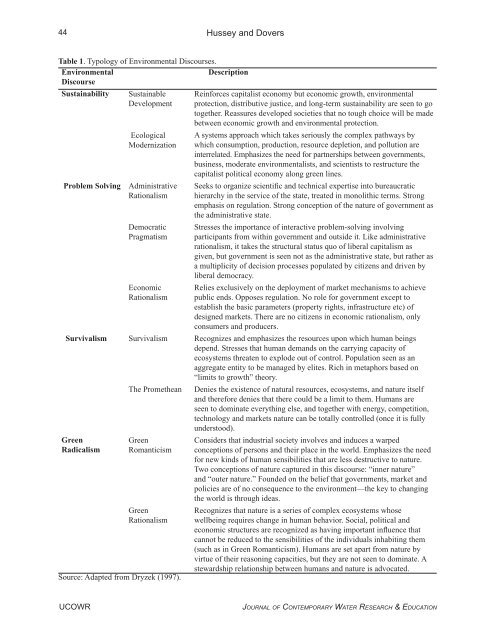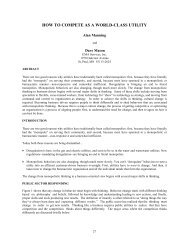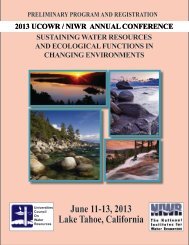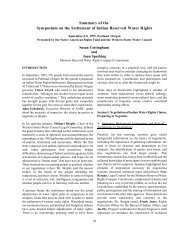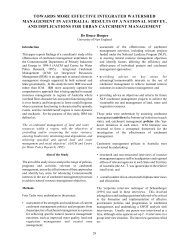Full Journal of Contemporary Water Research and Education, Issue ...
Full Journal of Contemporary Water Research and Education, Issue ...
Full Journal of Contemporary Water Research and Education, Issue ...
Create successful ePaper yourself
Turn your PDF publications into a flip-book with our unique Google optimized e-Paper software.
44Hussey <strong>and</strong> DoversTable 1. Typology <strong>of</strong> Environmental Discourses.EnvironmentalDiscourseSustainabilityProblem SolvingSustainableDevelopmentEcologicalModernizationAdministrativeRationalismDemocraticPragmatismEconomicRationalismDescriptionReinforces capitalist economy but economic growth, environmentalprotection, distributive justice, <strong>and</strong> long-term sustainability are seen to gotogether. Reassures developed societies that no tough choice will be madebetween economic growth <strong>and</strong> environmental protection.A systems approach which takes seriously the complex pathways bywhich consumption, production, resource depletion, <strong>and</strong> pollution areinterrelated. Emphasizes the need for partnerships between governments,business, moderate environmentalists, <strong>and</strong> scientists to restructure thecapitalist political economy along green lines.Seeks to organize scientific <strong>and</strong> technical expertise into bureaucratichierarchy in the service <strong>of</strong> the state, treated in monolithic terms. Strongemphasis on regulation. Strong conception <strong>of</strong> the nature <strong>of</strong> government asthe administrative state.Stresses the importance <strong>of</strong> interactive problem-solving involvingparticipants from within government <strong>and</strong> outside it. Like administrativerationalism, it takes the structural status quo <strong>of</strong> liberal capitalism asgiven, but government is seen not as the administrative state, but rather asa multiplicity <strong>of</strong> decision processes populated by citizens <strong>and</strong> driven byliberal democracy.Relies exclusively on the deployment <strong>of</strong> market mechanisms to achievepublic ends. Opposes regulation. No role for government except toestablish the basic parameters (property rights, infrastructure etc) <strong>of</strong>designed markets. There are no citizens in economic rationalism, onlyconsumers <strong>and</strong> producers.Survivalism Survivalism Recognizes <strong>and</strong> emphasizes the resources upon which human beingsdepend. Stresses that human dem<strong>and</strong>s on the carrying capacity <strong>of</strong>ecosystems threaten to explode out <strong>of</strong> control. Population seen as anaggregate entity to be managed by elites. Rich in metaphors based on“limits to growth” theory.GreenRadicalismThe PrometheanGreenRomanticismGreenRationalismSource: Adapted from Dryzek (1997).Denies the existence <strong>of</strong> natural resources, ecosystems, <strong>and</strong> nature itself<strong>and</strong> therefore denies that there could be a limit to them. Humans areseen to dominate everything else, <strong>and</strong> together with energy, competition,technology <strong>and</strong> markets nature can be totally controlled (once it is fullyunderstood).Considers that industrial society involves <strong>and</strong> induces a warpedconceptions <strong>of</strong> persons <strong>and</strong> their place in the world. Emphasizes the needfor new kinds <strong>of</strong> human sensibilities that are less destructive to nature.Two conceptions <strong>of</strong> nature captured in this discourse: “inner nature”<strong>and</strong> “outer nature.” Founded on the belief that governments, market <strong>and</strong>policies are <strong>of</strong> no consequence to the environment—the key to changingthe world is through ideas.Recognizes that nature is a series <strong>of</strong> complex ecosystems whosewellbeing requires change in human behavior. Social, political <strong>and</strong>economic structures are recognized as having important influence thatcannot be reduced to the sensibilities <strong>of</strong> the individuals inhabiting them(such as in Green Romanticism). Humans are set apart from nature byvirtue <strong>of</strong> their reasoning capacities, but they are not seen to dominate. Astewardship relationship between humans <strong>and</strong> nature is advocated.UCOWRJOURNAL OF CONTEMPORARY WATER RESEARCH & EDUCATION


